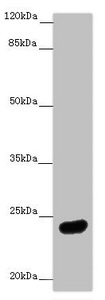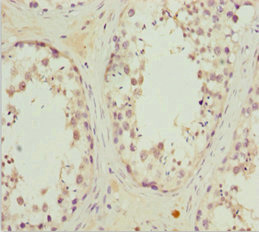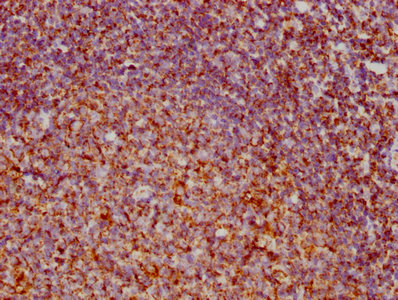MRAS Antibody
-
货号:CSB-PA014781ESR2HU
-
规格:¥440
-
促销:
-
图片:
-
其他:
产品详情
-
产品描述:
The MRAS polyclonal antibodies are produced by immunizing rabbits with the recombinant human Ras-related protein M-Ras protein (79-208aa), which triggers the rabbits' immune system to generate a diverse population of antibodies that recognize different epitopes on the antigen. These antibodies are then purified from the rabbits' serum by antigen affinity chromatography.
The MRAS antibody has been tested in ELISA, WB, and IHC applications for effective recognition and binding of the MRAS protein from human and mouse samples.
-
产品名称:Rabbit anti-Homo sapiens (Human) MRAS Polyclonal antibody
-
Uniprot No.:O14807
-
基因名:
-
别名:FLJ42964 antibody; M ras antibody; M-ras antibody; Mras antibody; Muscle and microspikes Ras antibody; Muscle RAS oncogene homolog antibody; Muscle Ras oncogene homologue antibody; Muscle Ras viral oncogene homolog antibody; R ras3 antibody; R-ras3 antibody; Ras related protein MRas antibody; Ras related protein RRas3 antibody; Ras-related protein M-Ras antibody; Ras-related protein R-Ras3 antibody; RASM_HUMAN antibody; Related Ras viral oncogene homolog 3 antibody; RRas3 antibody; XRas antibody
-
宿主:Rabbit
-
反应种属:Human, Mouse
-
免疫原:Recombinant Human Ras-related protein M-Ras protein (79-208AA)
-
免疫原种属:Homo sapiens (Human)
-
标记方式:Non-conjugated
-
克隆类型:Polyclonal
-
抗体亚型:IgG
-
纯化方式:Antigen Affinity Purified
-
浓度:It differs from different batches. Please contact us to confirm it.
-
保存缓冲液:PBS with 0.02% sodium azide, 50% glycerol, pH7.3.
-
产品提供形式:Liquid
-
应用范围:ELISA, WB, IHC
-
推荐稀释比:
Application Recommended Dilution WB 1:1000-1:5000 IHC 1:20-1:200 -
Protocols:
-
储存条件:Upon receipt, store at -20°C or -80°C. Avoid repeated freeze.
-
货期:Basically, we can dispatch the products out in 1-3 working days after receiving your orders. Delivery time maybe differs from different purchasing way or location, please kindly consult your local distributors for specific delivery time.
相关产品
靶点详情
-
功能:Serves as an important signal transducer for a novel upstream stimuli in controlling cell proliferation. Activates the MAP kinase pathway.
-
基因功能参考文献:
- acute coronary syndrome in Czechs (30.4% vs 29.4% carriers of the minor T allele of MRAS[recessive model], p = 0.54; OR 1.05; 95% CI 0.89-1.24 for males and 32.1% vs 29.7% carriers of the minor T allele, p = 0.28; OR 1.12; 95% CI 0.91-1.37 for females) PMID: 29264877
- Results discovered for the first time that MRAS is recurrently mutated, indicating that MRAS mutations could drive tumorigenesis of Type IV gastric neoplasm. PMID: 27891760
- The association of the MARS rs6782181 polymorphism and serum lipid levels is different between the Mulao and Han populations, or between males and females in the both ethnic groups. PMID: 25973078
- The MRAS gene loci might have a minor effect in conferring susceptibility to coronary artery disease in the Chinese population. PMID: 25800439
- Both MRAS and SHOC2 play a key role in polarized migration. PMID: 24211266
- implicated in a novel pathway of neuronal differentiation by coupling specific trophic factors to the MAPK cascade through the activation of B-Raf PMID: 12138204
- These findings proved a crucial role of the cross-talk between two Ras-family GTPases M-Ras and Rap1, mediated by RA-GEF-2, in adhesion signaling. PMID: 17538012
- Identification of one new CAD risk locus on 3q22.3 in MRAS, and suggestive association with a locus on 12q24.31 near HNF1A-C12orf43. PMID: 19198612
显示更多
收起更多
-
亚细胞定位:Cell membrane; Lipid-anchor; Cytoplasmic side.
-
蛋白家族:Small GTPase superfamily, Ras family
-
组织特异性:Expression highly restricted to the brain and heart.
-
数据库链接:
HGNC: 7227
OMIM: 608435
KEGG: hsa:22808
STRING: 9606.ENSP00000289104
UniGene: Hs.527021
Most popular with customers
-
YWHAB Recombinant Monoclonal Antibody
Applications: ELISA, WB, IF, FC
Species Reactivity: Human, Mouse, Rat
-
Phospho-YAP1 (S127) Recombinant Monoclonal Antibody
Applications: ELISA, WB, IHC
Species Reactivity: Human
-
-
-
-
-
-
VDAC1 Recombinant Monoclonal Antibody
Applications: ELISA, WB, IHC
Species Reactivity: Human, Mouse, Rat























